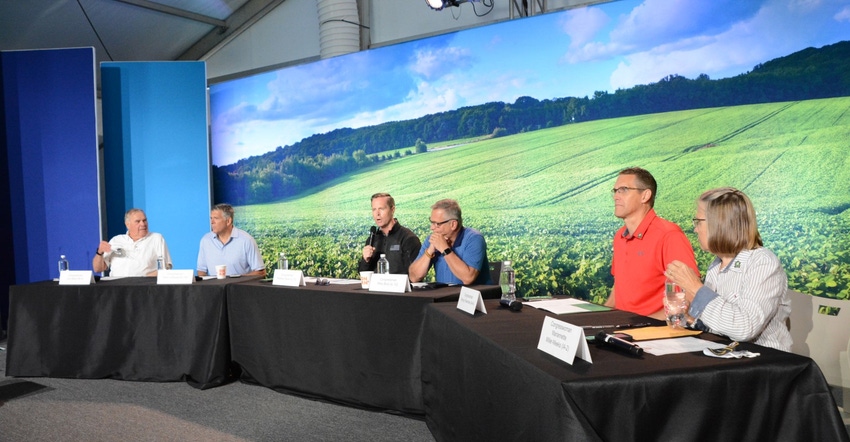
Demand for ethanol is at best stagnant, and by some accounts in decline. This requires not looking at the immediate future and expanding coalitions to advance biofuels, shares John Coupert, executive director at the National Corn to Ethanol Research Center during a Congressional Biofuels Summit held Wednesday at the Farm Progress Show.
Coupert was part of a line-up of speakers, legislators and farmers who discussed the importance of sustaining biofuels demand and building on that moving forward. Rep. Rodney Davis, R-Ill., who hosted the event in his home district including Decatur, Ill., says the House Biofuels Caucus will do everything it can to fight this administration in following the law of the land as it relates to the Renewable Fuels Standard and continue to advocate for the positive role farmers can play in today’s carbon discussion.
The event featured Congressional members Reps. Mike Bost, R-Ill., Darin LaHood, R-Ill., Randy Feenstra, R-Iowa, Mariannette Miller-Meeks, R-Iowa, and Jim Baird, R-Ind.
Bost says as this new administration and Congress are pushing forward on different clean energy ideas, solar and electric are considered renewable fuels, but they keep forgetting biofuels despite that it has “proven itself over and over again.”
Rich Guebert, president of the Illinois Farm Bureau, says ethanol can be an important transition fuel as internal combustion engines will be the predominant engine for the next several decades. Those in the agriculture community believe ethanol is an important high octane, low carbon fuel that reduces emissions, he explains.
Coupert says the discussion today can’t just look at the immediate future but must be looking long-term. He’s not opposed to electric vehicles, but as long as coal-burning power plants are still providing that power, it’s important to provide a level playing field.
“With a level playing field, ethanol cannot only compete with electric vehicles, but beat with a lower carbon footprint,” he explains.
Feenstra, who represents the No. 1 biofuels district in the country in northwest Iowa, says he’s not seen this administration be upfront about its actions on biofuels. “Now it’s time for the rubber to hit the road,” he says. With a recent Supreme Court ruling allowing for small refinery exemptions for those not previously approved and limitations on year-round E15 use, he’s introduced bills to provide clarity to counter the court rulings.
Feenstra joined his colleagues on the House Biofuels Caucus as an original cosponsor of the Year-Round Fuel Choice Act of 2021. This bipartisan effort seeks to ensure the Environmental Protection Agency can grant waivers allowing for the sale of higher ethanol blends year-round.
Several of the House Biofuel Caucus members also support or co-sponsored the Next Generation Fuels Act legislation led by Rep. Cheri Bustos, D-Ill. Illinois Corn Growers Association President Randy DeSutter called it “landmark legislation” that is going to change how automakers design engines to be more efficient and burn higher grades of ethanol more efficiently.
“If this legislation passes, ethanol is going to be able to compete a lot better with electric vehicles,” says DeSutter.
Related: New ethanol bill receives mixed reviews
The American Coalition for Ethanol sent a letter to House Committee on Energy and Commerce Chairman Frank Pallone, Jr., D-N.J., that called for a legislative hearing on the bill in order to receive testimony on how it would remove market barriers to ethanol and improvements that should be made to the legislation to reward farmers for climate-smart practices and ethanol producers for investments to reduce the carbon intensity of their fuel.
Davis says he remains open on ways to improve the bill and build a coalition to force a vote on the bill, and on Bustos to also encourage House Speaker Nancy Pelosi to bring the bill up. “We don’t get a chance to vote on any proposals unless the majority gives us a chance to debate in committee or on the House floor."
Davis says he’s angry he’s got to continue the fight with this administration to uphold the RFS. Reports indicate EPA is seeking a court remand of 31 exemptions from renewable volume obligations. Renewable Fuels Association President and CEO Geoff Cooper commends EPA’s efforts to reconsider the 31 SREs issued by EPA for compliance year 2018, but concerns remain.
“EPA’s own records reflect the fact that these exemptions were issued without any analysis or substantiation, and it is unsettling, yet unsurprising, that EPA doesn’t even have the records to account for all the RINs involved in these giveaways,” Cooper says. “While RFA supports EPA’s reevaluation of these lawless exemptions, we object to EPA’s remand request because it is unaccompanied by vacatur or some kind of limitations on its review. EPA has to act promptly if it wants to restore stability and integrity to the RFS.”
Guebert notes that U.S. production for renewable diesel is expected to quadruple from 2020 to 2022. Kent Engelbrecht, biodiesel trade manager for ADM, says that the future of biodiesel and renewable fuels is a challenge as well as an opportunity for farmers to increase soybean demand. But the biodiesel industry needs to know where Congress will land on the biodiesel tax credit.
LaHood notes the way Congress has addressed the extension of tax credits is “very dysfunctional” as it often waits until the last minute. LaHood, who serves on the House Ways and Means Committee, doesn’t think the biodiesel tax credit is going to get fixed by the end of this year.
Read more about:
EthanolAbout the Author(s)
You May Also Like






